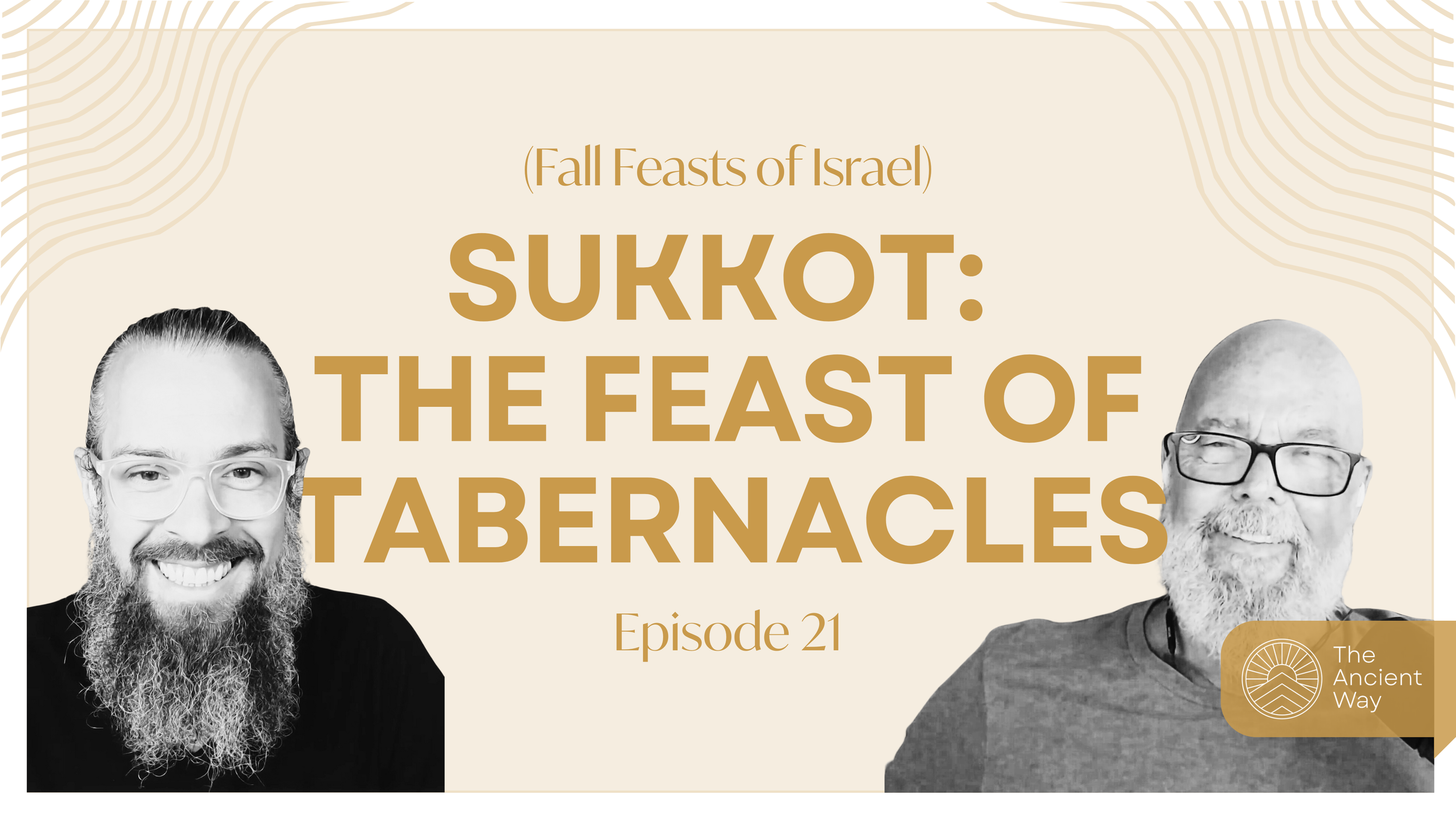What are the three Jewish fall feasts?
Did you know that God has a special calendar? Just like you may write down special reminders for things like birthdays or anniversaries, the Bible tells us about God's seven special times, holidays and seasons. In Hebrew the word used is moedim (מועדים) which means "appointed times."
Don't miss this!
God has appointed times where He wants to meet with His people and make His presence known in time. Days to remember His good with joy, celebration, and sometimes fasting.
The King of the Universe wants to meet with you!
Previously, we talked about the three spring feasts, but today we're going to unpack the three biblical fall festivals: Yom Teruah (The Feast of Trumpets or Rosh Hashanah), Yom Kippur (Day of Atonement), and the seven day celebration called Sukkot (Feast of Tabernacles). These three Jewish fall feasts are also known as “The High Holy Days,” because of their immense importance.
Let’s dive in!
A Sukkot table with two candles set overlooking a fall field (AI Image: The Ancient Way)
Yom Teruah: The Feast of Trumpets
30 days before Yom Teruah, begins the month of Elul, when the King is in the field. It's a time of preparation and repentance. A time of introspection to ready our hearts for the King—to ask forgiveness for our sins as He draws near.
Leviticus 23 says this:
Adonai said to Moshe, "Tell the people of Isra'el, 'In the seventh month, the first of the month is to be for you a day of complete rest for remembering, a holy convocation announced with blasts on the shofar. Do not do any kind of ordinary work, and bring an offering made by fire to Adonai.' "
—Leviticus 23:23-25
The Torah command is to make a lot of noise by blowing a trumpet, most often used is a shofar.
It's likened to the arrival of the King for His coronation declaring him the one on the throne, with the trumpet blasts announcing the good news!
The shofar blast is also a call to repentance. To wake up from our sleep as the 10 days of Awe leading up to Yom Kippur, the day of atonement begins.
Today, this biblical feast is referred to as Rosh Hashanah which means "head of the year", referring to the beginning of the Jewish New Year on the civil calendar, a tradition that goes back to the period of Babylonian exile when it was instituted.
This celebration in biblically considered a day of Sabbath rest where one would cease from their usual work, focus on God, and spend time in community.
One of my favorite moments connected with Rosh Hashanah is a ceremony that takes place next to a body of water called Tashlich. It comes from a Hebrew word that means "you will cast."
During this service, you gather by a lake or river, and pick up a stone that represents something you want to repent of. A verse from Micah 7:19 is read as the stones are cast into the water, never to be found again.
And with this we begin the 10 days of awe and repentance as we seek to prepare our hearts for Yom Kippur.
Yom Kippur: The Day of Atonement
10 days after Rosh Hashanah is Yom Kippur, the Day of Atonement.
In ancient Biblical times, one day a year was appointed by God for the High priest to purify himself physically and spiritually as he entered into the holiest place of the temple to make atonement in order to cover the sins of the nation of Israel.
Just like then, the day is solemn, where you fast from food for a day and turn your attention to the God who makes a way to cover our sins.
Its also a Sabbath day, where no work is done. The command to rest is repeated not once but five times! Rest and afflict yourselves. The command to afflict yourselves is why those observing this appointed time would fast.
You are not to do any kind of work; it is a permanent regulation through all your generations, no matter where you live. It will be for you a Shabbat of complete rest, and you are to deny yourselves; you are to rest on your Shabbat from evening the ninth day of the month until the following evening."
—Leviticus 23:32
Today, Yom Kippur starts with an evening service called Kol Nidre (“All Vows), where we gather at a local synagogue and pray prayers of repentance, asking our Father and King to forgive us for our short comings. We place ourselves before the King on humble reverence knowing that we have fallen short.
For those of us that are Messianic, we recognize that Messiah Yeshua's blood covers our sin. Isaiah 53 eludes to the the Messiah’s suffering making a way for healing and atonement for our iniquity, and with this in our mind and hearts, we both ask forgiveness of sins, and praise God for his loving kindness.
But He was pierced because of our transgressions, crushed because of our iniquities. The chastisement for our shalom was upon Him, and by His stripes we are healed.
The Righteous One, My Servant will make many righteous and He will bear their iniquities.
—Isaiah 53:5, 11b
As we fast, we turn our attention to our King. We ask him to forgive us again. We invite the Ruach, the Holy Spirit, to empower us and keep us from sin in the coming year. We strengthen our hearts anew to follow our God and his ways.
At the end of the day, we break our fast after Havdalah, the closing prayers for the Sabbath day. We eat a meal to strengthen our physical body.
Sukkot: The Feast of Tabernacles
5 days after Yom Kippur is the Seven day festival of Sukkot. Exactly 7 months since the Passover Seder was observed. Like the previous biblical festivals, the first and seventh day of Sukkot is consider a day of Sabbath rest.
“Speak to the children of Israel, and say, On the fifteenth day of this seventh month is the Feast of Sukkot, for seven days to Adonai. On the first day there is to be a holy convocation—you are to do no laborious work.
—Leviticus 23:34-35
Thus begins the Feast of Tabernacles, the only festival commanded to be celebrated with joy. And what a fun season it is!
But what is a Sukkah? A Sukkah is essentially a tent-like structure that the child of Israel lived in while traveling through the wilderness.
During Sukkot we remember not the bad times of the children of Israel wandering in the desert land, but instead we remember and celebrate God's gracious provision! How he met our needs. Kept us fed with manna from heaven, satiated our thirst with water from the rock, and covered his people with clothing that never wore out!
But in Messiah Yeshua he's done so much more. he is the living bread from heaven and the living water that nourishes our souls and gives us everlasting life!
The Leviticus command literally says to “dwell in booths” during the feast of Sukkot, and it’s tradition to build a sukkah in your back yard and spend some daily time in it. Many choose to decorate it with branches from local trees, colorful pictures, or perhaps flowers while enjoying at least one meal in the sukkah, underneath the light of the glowing full moon.
It’s a time of feasting and rejoicing—inviting friends over, enjoying life, and celebrating the goodness of our great God and King.
This feast is also one of prophetic significance—where one day Yeshua, our Messiah will return to set the world right and redeem His people. And when he does, we will celebrate the great feast with Him for seven days. (Revelation 19:7–10)
And finally, on the 8th day after Sukkot celebrations have come to a close, there’s an additional day added on called Simchat Torah (Joy of Torah) / Shemini Atzeret (8th Day Assembly) where everyone celebrates the fact that God has given us his instructions through Moses by way of the Torah. It’s a day of reading and studying, and you guessed it—celebrating.
If you haven’t experienced this before, I highly recommend that you visit your local synagogue if one is in your area to fully experience this!
Conclusion
And with the conclusion of the three jewish fall feasts, the annual cycle of reading through the Torah begins afresh. We turn back to the first pages on Genesis and we read scripture with eyes to see, ears to hear, and a heart that might understand what our Father would reveal to us in the coming year.
The three Fall Feasts of Israel are rich with significance. Yeshua celebrated them and because they are God’s special appointed times, he has continued to work during these moments of remembrance and celebration.
If you’re just now learning about them, I celebrate that with you! I also encourage you to participate by joining in with all of Israel and celebrating them. Visit a local Messianic congregation or celebrate the feasts at home—but most importantly, may you experience the presence of the living God who has chosen to dwell among His people.
His ways are full of life, joy, and peace. May you come to know the depths of His lovingkindness.
Shalom! 🙏
Dates of the 2025 Fall High Holy Days
Yom Teruah (Feast of Trumpets/Rosh Hashanah): September 22–23, 2025
Yom Kippur (Day of Atonement): October 1–2, 2025
Sukkot (Feast of Tabernacles): October 6–13, 2025
Simchat Torah / Shemini Aretz (the 8th day): October 14, 2025
Note that they all start near sundown on the evening of the first date, since the Jewish day begins at sundown until sundown the following day!







In this conversation, Jon and Jim explore the significance of Sukkot, the Jewish Feast of Tabernacles, and its relevance to both Jews and Gentiles. They discuss how Sukkot serves as a reminder of God's provision during wilderness experiences, the rituals associated with the feast, and how Jesus fulfills its meaning. The conversation also touches on the prophetic future of Sukkot and the importance of celebrating it as a way to trust in God's goodness and provision, even in challenging times.